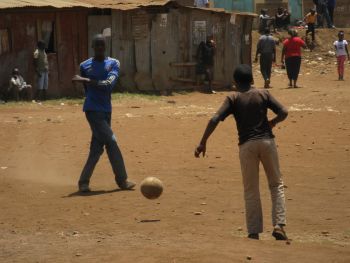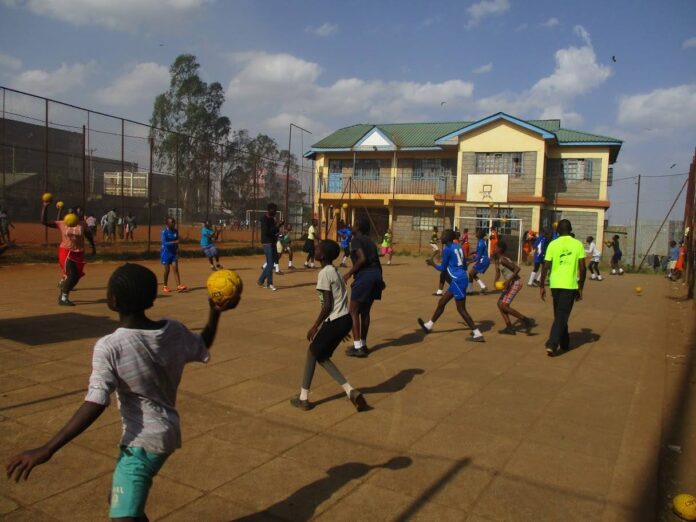By Roseleen Nzioka
Nairobi, Kenya: Anecdotal evidence from a targeted online search shows that many studies about adolescent pregnancies usually focus on the girl-child revealing all the challenges the young mothers experience while little or nothing is said about young boys who become fathers.
However, a seminal study launched recently in Nairobi, Kenya reveals that adolescent fathers suffer mental distress and economic and social struggles as they come to terms with becoming family providers at an early age.
The African Population and Health Research Center (APHRC), Miss Koch Kenya, and the Directorate of Children’s Services, Nairobi County, recently released a comprehensive study on the “Lived Experiences of Pregnant and Parenting Adolescents in Korogocho, Nairobi, Kenya”.

The study delves into the lives of both pregnant and parenting adolescents ages 10 to 19 years living in Korogocho, an informal settlement in Nairobi, and aimed at understanding the driving factors behind early pregnancy; the experiences of young mothers in healthcare facilities; the impact of adolescent childbearing on health and socio-economic well- being and how adolescent boys and girls navigate parenthood.
The lived experiences of 10 adolescent boys were captured in the study. The boys shared their personal experiences of being thrust into the role of being fathers at a young age.
The interviews revealed several reasons that drove adolescent boys to become fathers at an early age. Top among the reasons is that they lacked accurate information about contraceptives and parental supervision; abused alcohol and drugs; and were curious about sex.
Also, peer pressure pushed boys to engage in sex and put them at risk of early fatherhood. Becoming a father so early radically changed the lives of adolescent boys.
The boys revealed that adolescent fatherhood was frowned upon in the community and that boys who got girls pregnant were gossiped about, ridiculed, jeered, and rejected. Adolescent fathers were labeled and referred to by the name of the girl they impregnated.
Also, parents warned their sons not to associate with adolescent fathers. A 19-year-old interviewee in the study stated: “When you meet your friends with their parents, they are being warned not to walk with [you], so you find yourself isolated and heartbroken.”
Some community members supported adolescent fathers with baby items, but this only happened if the boy was living with his child’s mother. Most adolescent fathers reported facing financial challenges and a lack of job opportunities. Consequently, they were unable to meet their parental obligations.
Most of the adolescent fathers interviewed lived and depended on their parents/families for their daily provisions. However, they felt they had a responsibility to provide for their baby and the mother.
Despite being unable to adequately fulfill this role, a few interviewees dropped out of school to get unskilled, low-paying jobs to meet this responsibility. Better-paying jobs were inaccessible due to their young age, lack of national identity cards, low education attainment, and few or no skills.
For a few who took full responsibility and resided with their partner and baby, lack of experience as a father made it challenging, especially when their child was sick. Most of the time, they did not know what to do or how to become the best father they could be. Although they wanted to get involved in the baby’s life and take responsibility, they lacked enough resources to support their partner, baby, and family.
This sometimes led to conflicts and mental distress. Some expressed that they started using drugs more than before to ease the pressure. “I used to buy her fruits and sometimes, if I did some work, I would buy her clothes and take them to her. If I had some money like 100 shillings, I would give her mother to buy milk or bone soup for the girl. I also bought her nice dresses whenever I came across one, said one 17-year-old father.
Another 19-year-old said: “I find that most of the burden is on me, but I am trying. I am putting in more effort. The girl asks for a lot from me. I do struggle since in my job today you can get, the next day you lack.”
Those who lived together with their partner and baby also found other ways to assist, such as with house chores, babysitting, and moral support. However, a few did not provide any form of support because they could not see the child and no longer talked to the child’s mother. Becoming a father made the boys want to change their lifestyle for the better.
Most of them wanted to be involved in the day-to-day lives of their babies in the future. Despite dropping out of school, they wanted to raise children who would complete their education. They also desired to ensure that their children had good morals and that they would not lack basic needs. A few were determined to return to school to make something good out of their lives and help the girl return to school.
The boys expressed their desires for support, such as employment or financial support to start a business. Some wanted to enroll in courses to learn new skills that would enable them to earn a living. The boys expressed the need for guidance and counseling services to help them cope with the challenges of parenting.














